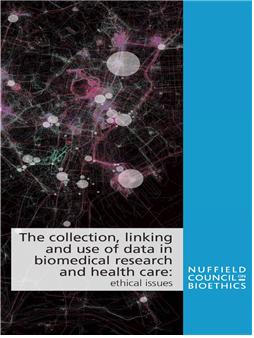The collection, linking and use of data in biomedical research and health care: ethical issues
| 주관연구기관 | NUFFIELD COUNCIL ON BIOETHICS |
|---|---|
| 발행년 | 2015 |
| 키워드 | bioethics,nuffield,ehtical issues, biomedical research |
| 관련링크 | http://nuffieldbioethics.org/wp-content/...ta_web.pdf |

The collection, linking and use of data in biomedical research and health care: ethical issues
http://nuffieldbioethics.org/wp-content/uploads/Biological_and_health_data_web.pdf
Contents Pages
Introduction 1
Data opportunities and threats 2
Values and interests at stake 4
Law, governance and security 6
Ethical governance of data initiatives 8
Data initiatives in health care systems 10
Population research data initiatives 12
This guide outlines the main themes and recommendations that are discussed
in the Nuffield Council on Bioethics’ report The collection, linking and use
of data in biomedical research and health care: ethical issues (published
February 2015).
The report considers the ethical questions raised by advances in information
technology and data science in the context of health care and biomedical
research.
The report was produced by an expert Working Party. In coming to its conclusions,
the Working Party invited contributions from a wide range of people including by
holding an open consultation that ran from October 2013 to January 2014.
SUMMARY
We are generating more data about people’s health and biology, from
more sources, than ever before including GP records, hospital notes,
laboratory tests, clinical trials, monitoring devices and health apps.
Advances in information technology and data science mean that it is
becoming easier, cheaper and more valuable to gather, transfer, link,
store and analyse these data. This offers significant opportunities to
generate new knowledge, improve medical practice, increase service
efficiency and drive innovation.
The report looks at the ethics of data use by considering the
relationship between privacy and public interest, and how
developments in data science and computing have put significant
pressure on conventional approaches to information governance,
including the approach of seeking consent or anonymising data for use
in research.
More needs to be done to ensure that respect for participants and
the protection of their data is at the centre of any initiative, through
participation and accountability, backed up by good governance, and
criminal penalties for the misuse of data. To marginalise individuals
who provide data means risking the trust of current and future
generations, exposing people to unacceptable risks, and ultimately
missing out on the benefits of research.
The report sets out key ethical principles for the design and governance
of data initiatives, and identifies examples of good practice relevant to
anyone approaching a data initiative, such as a principal investigator in
a research project, lead policy official or commissioner of services.
Copies of the short report and this guide are available to download
or order from the Council’s website: www.nuffieldbioethics.org
Published by
Nuffield Council on Bioethics
28 Bedford Square
London WC1B 3JS
Telephone: +44 (0) 20 7681 9619
Email: bioethics@nuffieldbioethics.org
Website: www.nuffieldbioethics.org
(c) Nuffield Council on Bioethics 2015
Published February 2015
- 첨부파일
- PDF Biological_and_health_data_web.pdf (1.91MB / 다운로드 0)
- 이미지 Nuffield council bioethics_ethical issues 표지.jpg (19.1KB / 다운로드 0)



